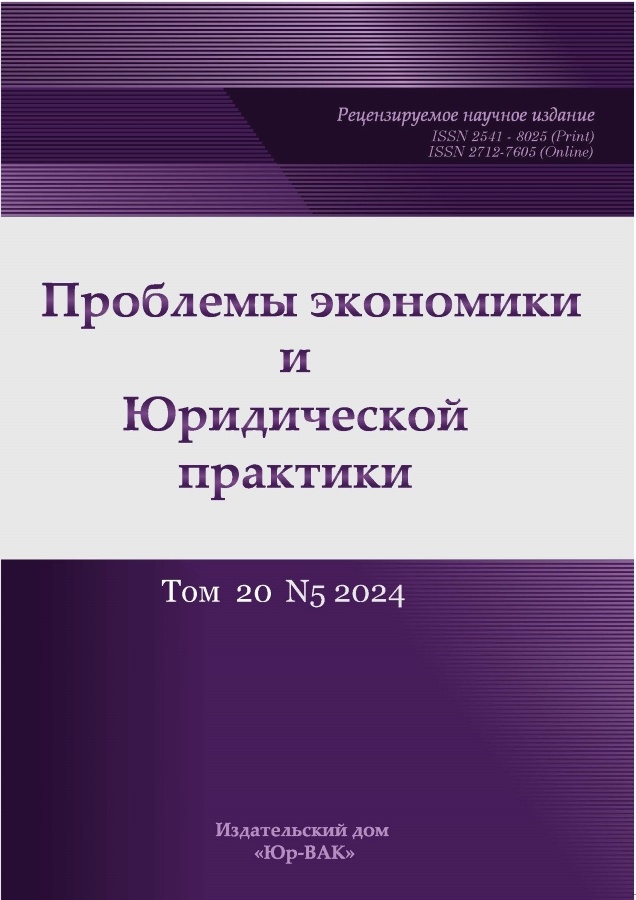Long-term Priorities of Spatial Development of Russia's Economic Resources
- Authors: Orlov S.L.1, Khachatryan A.A.1
-
Affiliations:
- Financial University under the Government of the Russian Federation
- Issue: Vol 20, No 5 (2024)
- Pages: 151-156
- Section: Regional and Sectoral Economics
- URL: https://journals.eco-vector.com/2541-8025/article/view/685630
- DOI: https://doi.org/10.33693/2541-8025-2024-20-5-151-156
- EDN: https://elibrary.ru/LMXMIV
- ID: 685630
Cite item
Abstract
The modern spatial development of the Russian economy in the context of diverse and tough challenges is gradually undergoing significant changes based on long-term transformational transformations. At the heart of this kind of new cardinal paradigm is the transition to the historically most acceptable Russian civilizational platform. But this transition simultaneously marks a fundamentally different vision of the entire long-term national social trend, including socio-economic and spatial development at the stage of progressive progress towards a new economy. This article examines the strategic priorities of the spatial distribution of Russia's economic resources in the long term The purpose of the research is to present the interaction and continuity of the basic foundations and long-term priorities of Russia's spatial development. Results. The long-term priorities of the spatial distribution of economic resources are presented in the context of two groups: national doctrines (basic foundations) and general long-term priorities. In a fundamental aspect, the first group can be considered fundamental for ensuring the requirements of national security, the most important condition of which is the realization of Russia's national interests and strategic priorities. At the same time, the totality of the components of this group can also be considered as a basic theoretical and methodological imperative for the second group of resource priorities of a functional and applied nature.
Full Text
About the authors
Sergey L. Orlov
Financial University under the Government of the Russian Federation
Author for correspondence.
Email: slorlov@fa.ru
SPIN-code: 7254-5800
Scopus Author ID: 681572
Dr. Sci. (Econ.), Professor, Chief Researcher at the Institute of Regional Economics and Inter-Budgetary Relations
Russian Federation, MoscowAstghik A. Khachatryan
Financial University under the Government of the Russian Federation
Email: AAHachatryan@fa.ru
ORCID iD: 0000-0001-6493-680X
SPIN-code: 2695-2955
Scopus Author ID: 57211625263
Researcher at the Institute of Regional Economics and Inter-Budgetary Relations
Russian Federation, MoscowReferences
- Abalkin L. Russia: understanding fate. —M.: Publishing house «Ekonomicheskaya gazeta», 2012. —864 P.
- Kantorovich L.V. Economic calculation of the best use of resources—Certain approaches to the specifics of the placement of productive forces in these territories are viewed in the proposed article. —M.: Publishing House of the Academy of Sciences of the USSR, 1960. —348 p.
- Chadaev Ya.E. The economy of the USSR during the Great Patriotic War (1941–1945). —2nd ed., revised. and additional. —M.: Thought, 1985. —494 p.
- Glazyev S.Yu. Beyond the horizon of the end of history. Monograph, Moscow: Prospect, 2023. —416 P.
- Grinberg R.S., Belozerova S.A., Sokolovskaya E.V. Efficiency assessment. economic sanctions: opportunities for systematic analysis // The economy of the region. —2021. —Vol.17, issue 2. —pp. 354–374.
- Minakir P.A. The thorny path to the East: breakthroughs turning into dead ends // Spatial Economics. —2022. —No. 3. —pp. 7–16.
- Minakir P.A. The foreign trade factor of the economy of force majeure: spatial maneuver // Spatial economics, IEI FEB RAS. —2023. —No. 1. —pp. 7–19.
- Minakir P.A. The Russian economic space: strategic dead ends // The economy of the region. —2019. —Vol.15, No. 4. —pp. 967–980.
- Polterovich V.M. L.V. Kantorovich's Theory of optimal resource allocation in the field of programming // New Economic Association. —2012. —№1 (13). —pp. 176–180.
- Leksin V.N., Porfiriev B.N. Russian Arctic: logic and paradoxes of change // Problems of forecasting. —2019. —No.6. —pp. 4–21.
- Leksin V.N., Porfiriev B.N. Other Arctic: experience of system diagnostics // Problems of forecasting. —2022. —No. 1. —pp. 34–44.
- Orlov, S. L. Historical and socio-economic conditions of world development as factors of spatial distribution of economic resources / S. L. Orlov, P. V. Stroev // Creative economics. —2023. —Vol. 17, No. 4. —pp. 1177–1192. —doi: 10.18334/ce.17.4.117584.
- Makar, S. V. Category «economic resources»: topical accents in the context of spatial analysis methodology / S. V. Makar, P. V. Stroev // Regional Economics. The South of Russia. —2023. —Vol. 11, No. 2. —pp. 16–24. —doi: 10.15688/re.volsu.2023.2.2.
- Bukhwald E.M., Kolchugina A.V. Spatial development strategy and national security priorities of the Russian Federation // The economy of the region. —2019. —Vol. Issue 3. —pp. 631–643.
Supplementary files










